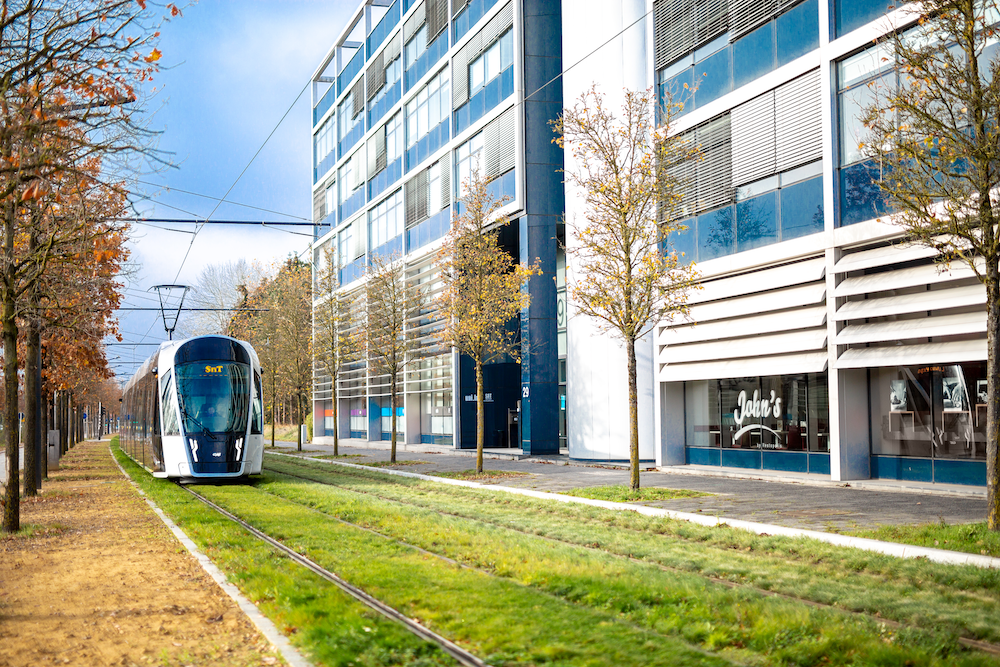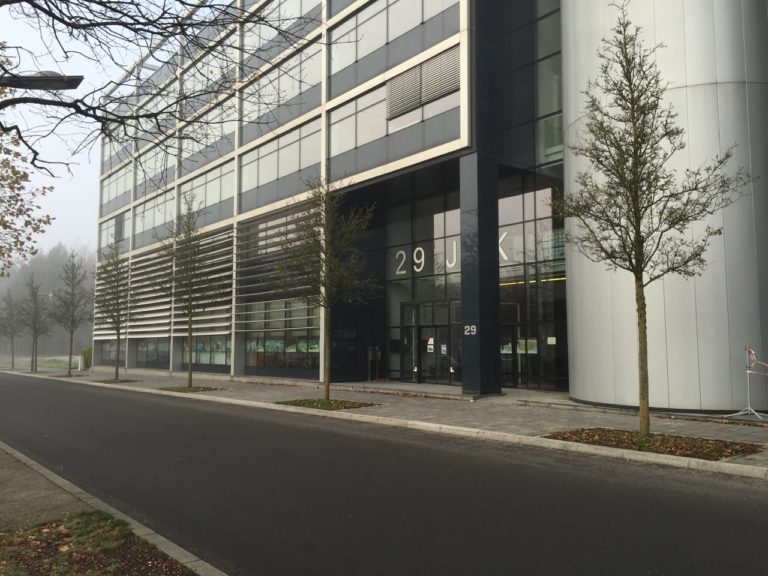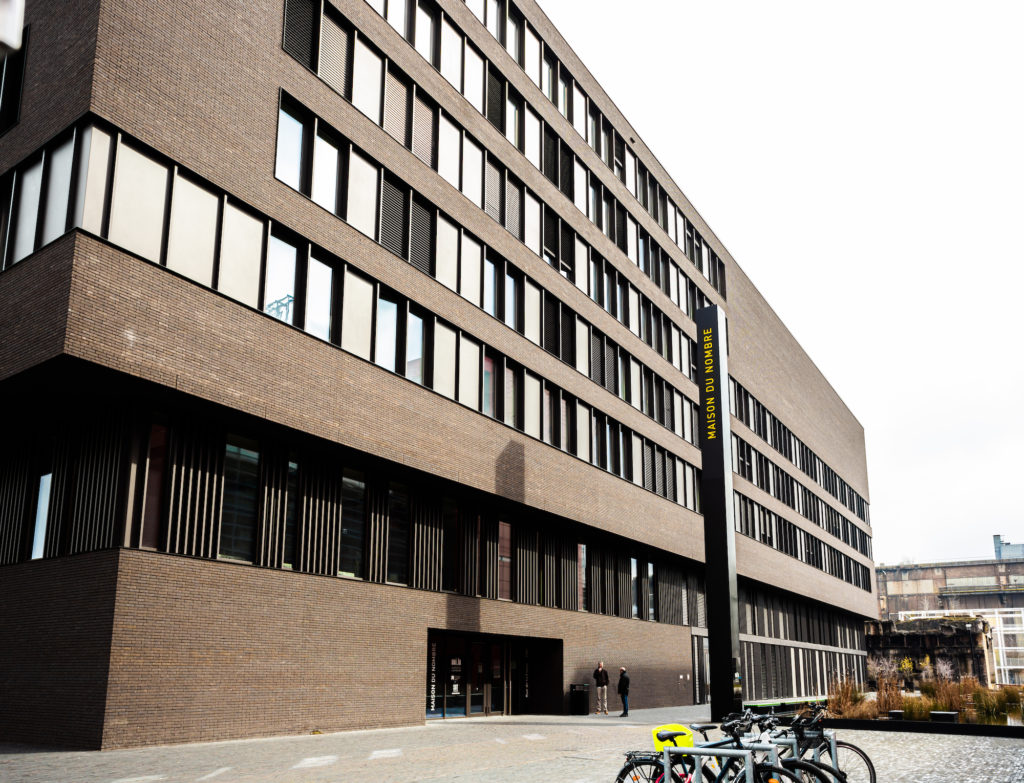Our interdisciplinary, award-winning research is driven by industry partnerships focusing on four areas: FinTech, Space Systems, Cybersecurity, Autonomous Vehicles and Internet of Things.

Since the Centre’s foundation in 2009, our team has grown to encompass a large number of scientists and doctoral candidates working on fundamental and applied research projects. Our researchers gain access to SnT’s global network, forming successful and long-lasting relationships in business and academia based on scientific excellence. Our talented staff join us from all over the world and specialise in a variety of ICT disciplines, launching spin-offs and enriching the local market.
Every day, their work contributes to creating innovation in Luxembourg and abroad.
Jens Kreisel
Chairman, President, University of Luxembourg
Anne-Catherine Ries
Premier Conseiller de direction, Ministère des Communications et des Médias, Le Gouvernement du Grand-Duché du Luxembourg
Ruy Pinto
CTO, SES
Pierre Zimmer
CIO, POST Luxembourg
Mario Grotz
Premier Conseiller de Gouvernement, Ministère de l'Économie, Le Gouvernement du Grand-Duché du Luxembourg
Björn Ottersten
Director
Yves Le Traon
Carlo Duprel
Jean Hilger
Isabelle Chesnay
Plus 18 Heads of Research Groups
Our centre is strategically located on two sites – in Luxembourg City’s Kirchberg financial district, and on the University’s vibrant Belval Campus. Both locations host state-of-the-art equipment for hardware and software testing, with more than ten labs that researchers can use to validate their ideas. Each of them offers a unique environment for work related to SnT’s research in computer vision, satellite communications, nanosatellites, autonomous driving, aerial and orbital robotics, server networks, cybersecurity and safety, as well as artificial intelligence.
Kirchberg Campus
29 Avenue John F. Kennedy
1855 Luxembourg
Tram Stop: Université

2 Avenue de l’Université
4365 Esch-sur-Alzette

Björn Ottersten is the director of SnT, having established our Centre in 2009. As an award-winning scientist with over 30 years of experience in his field, Ottersten is a renowned scientist and has notably been awarded the European Research Council advanced research grant twice. His fields of research include signal processing, wireless communications, radar and computer vision.
Ensuring the security, safety, and reliability of software systems is crucial to our lives. SVV conducts research in automated testing, as well as requirement engineering, design-time and runtime verification, security analysis and testing, and regulatory compliance to create reliable, scalable solutions to real-world challenges. Current fields of application include space, FinTech, legal, automotive, and e-government.
Technology affects the evolution of entrepreneurship and innovation, creating completely new business models and funding opportunities. The Entrepreneurship, Innovation and New Technology (EINT) group conducts interdisciplinary research on topics such as space entrepreneurship, emerging funding avenues, intellectual property, and sustainability.
The Finnovation Hub identifies key areas to advance the digital transformation of Luxembourg’s financial institutions, facilitating their collaboration with SnT researchers to develop ground-breaking technologies with an interdisciplinary approach. Its aim is to improve efficiency of processes, reform business models and advance digital services to shape the financial industry of tomorrow.
APSIA’s mission is to develop and evaluate techniques to mitigate the multitude of cyber threats, and make the digital world more secure and trustworthy for its citizens. This covers design and verification of cryptographic protocols, privacy-enhancing technologies, secure voting and digital democracy, as well as encompassing quantum and post-quantum cryptography to future-proof security.
CVI2 conducts research in real-world applications of computer vision, image analysis, and machine intelligence, with extensive development of AI approaches. Typical fields of application are space, Industry 4.0, surveillance, cybersecurity, healthcare, and automotive. The expertise of CVI2 spans all stages of computer vision, including acquisition, processing, analysis, and decision.
Ever-evolving wireless communications and sensing require increasingly efficient systems to transmit, analyse and receive high-quality data. SIGCOM conducts research aimed at designing, emulating and testing new high-performance systems for the future of mobile and satellite communications, and radar signal processing. Fields of applications range from 5G/6G telecommunications to satellite-based internet connectivity, and radar sensing in automotive and indoor applications.
UBIX research group investigates ways to make technology more pervasive, interconnected, and autonomous. The main focus areas are: distributed systems, intelligent systems, ubiquity, security and privacy. The main applications areas are Autonomous Vehicles, IoT, Industry 4.0, Edge computing, and Smart cities.
Software development is a complex engineering effort that requires novel techniques to ensure security, reliability, and quality. TruX conducts research in software security, software repair and explainable software, to create key practical solutions for developers, allowing them to achieve trustworthiness, efficiency, and transparency. Application areas include FinTech, embedded systems (e.g. mobile), business or entertainment systems, cybersecurity, and more.
Signal processing enables an understanding of many facets of our lives including audio, visual and cognitive faculties, while enabling nearly every aspect of it: personal safety, environment cognition, communications, and more. The Signal Processing Applications in Radar and Communications (SPARC) group conducts research on topics such as the design and optimisation of networked MIMO radar systems, integrated sensing and communications, automotive radars and indoor sensing, but also on new and future applications of radar signal processing in areas like biomedicine and environmental sensing.
Many complex technical systems need to execute their tasks efficiently with an increasing degree of autonomy, requiring flexible and intelligent automation. ARG conducts research to enable mobile and industrial robots, autonomous vehicles, as well as space and energy systems, to better perceive the world around them and to interact with it in an optimal and intelligent way.
Essential security protocols for communications, such as those used in email, cloud computing and IoT devices, are based on cryptographic algorithms. CryptoLUX analyses these algorithms and designs new, more efficient ones to establish the secure standards of the future. The group also investigates security, privacy, and scalability aspects of blockchain-based technologies for FinTech.
The Office team ensures the management and coordination of the below functions in order to deliver core operating services within the centre, but also to other University of Luxembourg entities. Some of the activities covered by the Office team include project coordination, human resources, financial budgeting, facilities, admin and more.
FINATRAX conducts research on the application and impact of digital technologies like lockchain, Digital Identities, Artificial Intelligence, and 5G, on organisations in the private or public sector. By doing so, it builds bridges between business research and information systems engineering.
Systems that hide design flaws, puzzle users, or fail to implement security requirements, remain exposed to misuse and cyberattacks. Reliable, secure, and trustworthy systems have no bugs or design flaws, are easy to use and comply with standards. IRiSC recognises this complexity and integrates methods from social sciences and legal compliance into computer science to conduct research on sociotechnical cybersecurity.
Businesses and citizens alike need trusted and efficient solutions to transmit, secure, store and analyse ever-increasing volumes of data. SEDAN conducts research in data analytics and Machine Learning in FinTech, security for blockchain applications and decentralised finance (DeFi). The group also directs projects on the security aspects of networking, vehicular networks and cloud-based infrastructures.
Critical information infrastructures and cyber-physical systems protect our most sensitive assets, such as healthcare and financial data, satellites and the energy grid. CritiX conducts research in creating robust and resilient systems, enabling them to withstand attacks and accidental faults, while being able to survive and operate without disruptions occurring as a result.
Solving today’s scientific and real-world problems not only requires high performance computing (HPC), but also new generations of Artificial Intelligence algorithms. PCOG conducts research in parallel computing, as well as search and optimisation techniques, to provide efficient, scalable and robust solutions to state-of-the-art, large-scale discrete/combinatorial problems.
The Technology Transfer Office (TTO) is SnT’s link with industry, the public sector, and other innovation activities on a local and international level. The TTO oversees the Partnership Programme, where researchers can interact with industry at all stages of research. As a result, our research has high impact thanks to our collaborative approach with public and private organisations. Furthermore, the TTO helps to transform research results into real-world innovation.
Services and infrastructures in space are vital for our society and rely on increasingly sophisticated systems. The Space Systems Engineering group aims to research and develop novel space services based on space systems that are miniaturised and distributed, including ChipSats and CubeSats, operated in swarms and formations, in-space manufacturing, and in-situ resource utilisation.
SerVal conducts research in security and reliability in software engineering, with a particular focus on AI, data science and decision-making, as well as designing, testing, and debugging. The group’s goal is to improve software quality across a variety of domains, including FinTech, Energy and Industry 4.0.
The new space age relies on advanced technology for its breakthroughs – with robotics at its very core. SpaceR conducts research in autonomous planetary and orbital robotics for space exploration, in-situ resource utilisation and orbital servicing. In addition, the group also focuses on aerial and ground robotics and multi-robot cooperation.